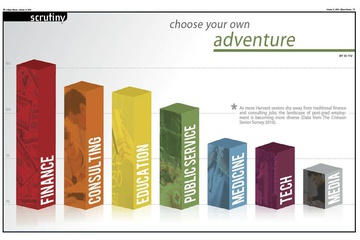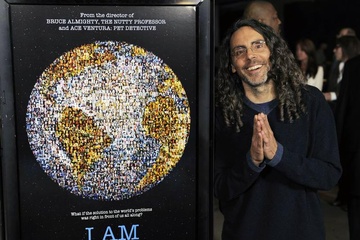This November, Lawrence S. Cripe ’13 has class only three to four days a week. The reason isn’t because he’s a slacker—it’s because he’s busy networking in the financial world, where big banks don’t cater to the class schedules of college kids.
“A lot of times, it feels like a fifth or sixth class,” he says, “this month, I spent last Thursday and Friday at Barclay’s, this Friday at Goldman, and next Friday I’ll be at JP Morgan. They fly me out to New York at 6 or 7 in the morning and fly me back at 7:30 at night.”
For Cripe, balancing career aspirations with schoolwork consumes much of his waking life: doing homework in anticipation of missing Thursday and Friday classes; maintaining connections by sending an exhaustive number of e-mails, thank-you cards, and the like; annotating The Wall Street Journal and close-reading Vault Guide books.
These days, getting summer internships and jobs seems to be more competitive than ever. With rising numbers of applicants to top-tier schools, there is a commensurate increase in the number of applicants to so-called “top-tier” internship and job opportunities. In the business world, it’s the usual: Goldman Sachs, Blackstone Group, JP Morgan. And as people like Cripe see it, the traditional resume-in-the-mail approach has been eclipsed by the overwhelming necessity to make personal connections.
“When I came to college, I don’t think I really understood the necessity of networking. I assumed job searching and internship searching would be exactly like the college application process. When I got here, I realized that it’s very much a people game.”
THE PEOPLE GAME
Not everyone sees the same importance in networking. One member of the Class of 2012 taking a semester off to work at a major corporation in South Korea, where he is in the corporate development division, downplays the value of connections in closing the deal on an offer.
“I don’t necessarily agree that it’s ‘who you know,’ not ‘what you know.’ Having good connections will help you through the first-round interviews, but in the second-round interviews, connections are far less important than professionalism, preparedness, and communication skills,” he says.
He found his current job exclusively through Crimson Careers, the Office of Career Services’ online job database, which he also used to find his previous summer internship working in a mayor's office in California. He had a good experience with finding job opportunities through OCS, but again stresses his opinion that the job fair element of the OCS process was the least valuable.
“If you make a strong impression and have a good resume, you might get through the door, but in general, the relationships you build with representatives at job fairs are just not strong enough,” he says.
Although Cripe also applied for his first internship through OCS, he says that there was only so much that they were able to do for him.
“I think OCS does very much what Harvard does: ‘We have thousands of resources, here’s the door to them, you walk through it.’ They have contacts, but it’s very much in the Harvard strain," Cripe says. "If you want it, you better be putting in most of the effort, which is fine with me.”
Cripe, who is gay, acknowledges that he has a slight edge in his networking efforts because many large banks have specific programming for LGBT applicants, giving him a chance to make connections where others may not.
“It’s as simple as going to recruiting sessions and talking to one person for an hour—just one person,” Cripe explains. “I try to have the recruiters recognize me and get one or two people who will go to bat for me.”
Despite the obvious importance of one’s transcript, resume and interview, Cripe insists that in the end it may come down to one of these people. Cripe relates what he was told by one representative of a major bank, “He said it’s their rule of thumb that if they don’t know you and don’t have a record of having met you, they won’t interview you, no matter how qualified you are.”
ON THE OTHER COAST
In entertainment, there’s no disputing the primacy of networking. For students such as Sanyee Yuan ’12, a special concentrator in Narrative, Rhetoric, and Performance, OCS does not provide quite the same palette of options at job fairs. She described two disappointments. “[At on-campus job fairs] Disney looks for people to work in financial and business affairs—they weren’t looking for people to develop the films,” she says. “Same this year with Pixar. They were looking for people on the business side of things, not people to make their movies,” she says.
Yuan is an undergraduate liaison for Harvardwood, an alumni association of Harvard alums in Hollywood, created with the intent of connecting alumni and current Harvard affiliates who seek careers in entertainment, media, and the arts. For students like Yuan, Harvardwood provides an invaluable link to professionals in these fields.
For example, Yuan describes how Harvardwood once helped bring her closer to her dream job, hosting the (now-canceled) television show Total Request Live on MTV. Through an internship at the San Francisco Harvardwood offices, Yuan met someone who knew someone, who in turn knew a former producer of the television show TRL. By luck and persistence, she was able to schedule a brief meeting with this producer.
It turned out to be a valuable learning experience for Yuan. “I was checking in with the security guard, and he said, ‘What are you here for?’ And I said, ‘Just a talk,’ and he said, ‘No, you’re here to get a job.’ This was one of those moments when I thought, ‘Shoot, that should have been my perspective.’”
The meeting did not result in any job offer or internship, but it did leave her better prepared moving forward.
“I never know when someone’s going to help me in the future,” she says.
Madeleine A. Bennett ’11 is also a student liaison for Harvardwood and recalls that her successes at securing internships and jobs began with an intersession trip to Los Angeles sponsored by Harvardwood during her sophomore year. During the trip, she met professionals involved in the entertainment business and eventually secured an offer for the summer, interning at a firm in Los Angeles called Management 360. Through a positive relationship with her boss there who happened to work with Tobey Maguire, Bennett secured the opportunity to intern with the star himself.
“It’s funny looking back: Tobey Maguire is a vegan and he has a personal chef, and so when I would go to his house in the Hills to read him scripts for a few hours in the afternoon, I’d first get to lunch with him. I wasn’t being paid for the internship, so I was living couch to couch, but once a week I’d have this amazing meal with a movie star in Hollywood,” she says.
The gains of the networking game, though sometimes glamorous, aren’t always as tangible as say, an “A” smiling up with red-inked permanence from the corner of your latest paper. But regardless, the work is perpetual.
“You can never feel like you’ve done enough. There’s always one more person you could have talked to, there’s one more e-mail you could have sent, there’s one more connection you could have been able to make,” says Cripe. “There’s no completed project until you finally have the offer.”




